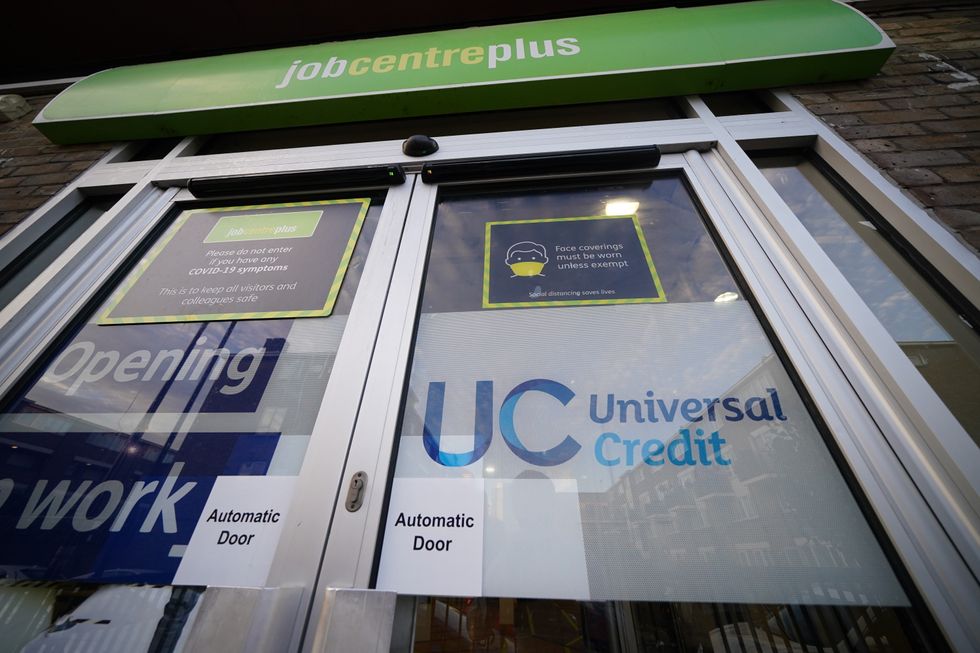Stella Creasey says cutting benefits will not 'magically' create jobs for unemployed
GB NEWS
Labour is in the process of overhauling the DWP status quo as Universal Credit payments come under tighter scrutiny
Don't Miss
Most Read
Trending on GB News
The Department for Work and Pensions (DWP) is in line to get the power to check bank accounts of Universal Credit claimants with savings of just £6,000 or more.
This new measure forms part of the Labour Government's plan to slash £5million from the welfare budget by 2030, which is being spearheaded by DWP Minister Liz Kendall.
Under the proposals in the Fraud, Error and Debt Bill, benefit payments will be reduced for those with savings between £6,000 and £16,000.
Currently, Universal Credit rules outline that individuals or couples with over £16,000 in savings are not eligible for benefit payments at all.

The DWP is set to check bank accounts under a sweeping Universal Credit clampdown
GETTY
The new powers will allow the DWP to require banks and financial institutions to share information about claimants' accounts to verify benefit entitlement.
According to the DWP, for those with over £6,000 in cash, savings and investments, "your payment will be reduced by £4.35 for every £250 you have between £6,000 and £16,000".
An additional £4.35 is deducted "for any remaining amount that is not a complete £250". This means the DWP considers savings above £6,000 to generate a notional monthly income.
For example, if a claimant has £6,300 saved, the £300 over the £6,000 threshold is deemed to bring in £8.70 per month. This amount is then deducted from their Universal Credit payment.
Do you have a money story you’d like to share? Get in touch by emailing money@gbnews.uk.
The system creates a sliding scale where benefit payments gradually decrease as savings increase, until reaching the £16,000 upper limit where eligibility ends completely.
The Fraud, Error and Debt Bill will grant the DWP new powers to access financial information of benefit claimants. According to DWP guidance, banks and financial institutions will be required to "provide information to help verify a claimant's entitlement to benefits and identify incorrect payments".
Financial institutions will need to examine accounts receiving DWP benefit payments and match them against specific eligibility indicators. These indicators will be defined within an Eligibility Verification Notice sent to banks.
The DWP has clarified that "no personal information will be shared by DWP" in this process. The powers will only apply to accounts receiving specified DWP benefits and any linked accounts that match the eligibility criteria.
 Universal Credit is changing PA
Universal Credit is changing PAAny accounts identified through this process will be "considered by DWP for further inquiry, if necessary". The guidance emphasises that "no decisions about benefit entitlement will be made on this information alone".
Banks and financial institutions will be required to share only limited information when responding to an Eligibility Verification Notice. This information could include specified details about the account, such as sort code and account number.
They may also need to provide specified details about the account holders, including their names and dates of birth. Additionally, banks will share specified details about how the accounts meet the eligibility indicators set by the DWP.
The eligibility indicators will be based on the rules for specified benefits. For Universal Credit, this includes the rule that individuals cannot hold more than £16,000 in savings and remain eligible, unless the capital falls under a specified exception.
The system is designed to flag accounts that may require further investigation by the DWP. However, the department stresses that additional inquiries would be necessary before any action is taken.
Kendall said: "We are turning off the tap to criminals who cheat the system and steal law-abiding taxpayers' money.
LATEST DEVELOPMENTS:
 Liz Kendall said she would "bring forward a proper plan to get Britain working and put the benefits bill on a sustainable course"PA
Liz Kendall said she would "bring forward a proper plan to get Britain working and put the benefits bill on a sustainable course"PA"This means greater consequences for fraudsters who cheat and evade the system, including as a last resort in the most serious cases removing their driving licence."
The impact of savings on benefits extends beyond Universal Credit. For those claiming income-based Jobseeker's Allowance, income-related Employment and Support Allowance, Income Support or Housing Benefit, different rules apply.
These benefits see a £1 weekly deduction for every £250 in savings above the £6,000 threshold.
These payments are typically received every two weeks rather than monthly.








